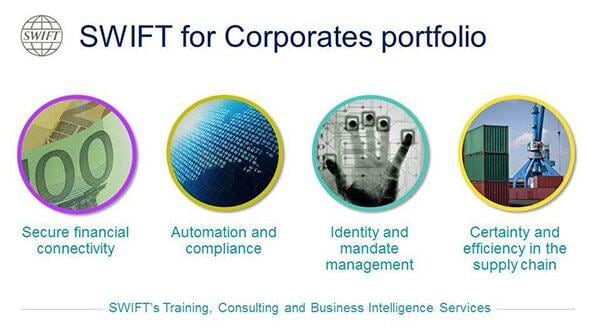The Global Head of Trade Products at UniCredit shares his views on Swift's role in the corporate market.
During the past few years, Swift has made significant inroads in the corporate-to-bank arena. Today we count more than 1400 corporates on Swift, have a market share of around 45% of the Fortune Global 500, and reach more than 1800 banks globally through the ‘Swift for Corporates' offering. Take-up has traditionally been strong among larger corporates in mature markets. Recent expansion has broadened this base to also include mid-sized corporates with a turnover below 1 billion USD.
Swift's high-level ambition towards 2020 is to move fast to become the preferred secure network for multi-banked corporates globally. This ambition calls for close collaboration and dialogue with Swift‘s membership and this is facilitated by Swift's Corporate Advisory Group (CAG), whose role is to advise the Board of Swift on corporate-related topics.
Recently, UniCredit's Markus Wohlgeschaffen, Global Head of Trade Products, joined this advisory committee and we asked him and André Casterman, Swift's Global Head of Corporate and Supply Chain Markets, to share their views on their future work.
Markus, what is your new role in Swift's Corporate Advisory Group (CAG)?
MW: I see my new role as an intermediary between member banks on one side and corporates on the other: the CAG gives input to Swift with respect to the expectations of corporate clients and banks' strategies to meet those expectations. The role requires solid banking know-how, a deep understanding of the trade environment globally and of course close contacts with trade clients. As a member of the Global Trade Industry Council of BAFT and the ICC Banking Commission Advisory Board, I have the privilege to get first-hand industry insights. Translating all the information into tangible solutions that provide value for corporates and banks will be the main challenge of this new mandate.
It is important to mention that as a new CAG member I´m representing the German Swift community in cooperation with the German National Member Group (NMG). For Germany, as one of the most important exporting countries, it is fundamental to maintain competitiveness. Politicians and corporate representatives underline the importance of "Industry 4.0" in that respect. As a result there is particular interest in leveraging (data) standards and digitization. The optimization of working capital along the supply chain is one of the key focal areas for corporate clients. Banks and their partners like Swift must create products and services that meet such requirements.
The Corporate Advisory Group (CAG) is one of the Swift business committees that guides the Swift Board in strategic decision making. It reports into the Banking and Payment Committee (BPC) which feeds decision-making on the Swift Board, which our co-head of Global Transaction Banking Claudio Camozzo attends.
André, why is Swift increasing its focus on the corporate market? How is Swift's role in this market developing?
AC: Until 2012, Swift was providing multi-national corporates with a multi-bank host-to-host channel. During recent years, we have expanded our offering substantially to include additional standards and technologies that address both banks' and corporates' technology needs in transaction services. Finding the right balance and developing win-win propositions is key in this process and this is where Swift scores highly, thanks to its cooperative governance and mindset. Our ambition is to become banks' preferred business development platform in treasury and trade. This requires us to connect a growing number of multi-banked corporates and to enrich our 4-pillar portfolio.
Whereas the CAG has focused strongly on channel integration and standardisation during the past few years, it is now expanding into shaping Swift's strategy in treasury and trade. We are thus recruiting product heads of payments as well as product heads of trade finance. The CAG recently helped Swift shape its Swift2020 strategy for the corporate market.

Markus, how does UniCredit use Swift today?
MW: In addition to the typical utilization of Swift to offer and execute cash and trade finance products, UniCredit has promoted Swift services for cash management purposes. This is what clients also expected Swift to offer: a standardised channel for transaction services. This has evolved over time. Swift has enlarged its services and standards portfolio into the trade space. Particularly the MT798 standard and the BPO (Bank Payment Obligation) have helped us to cope with two major challenges that remained open: multi-banking communication and solutions for documentary trade and open account business. In that respect, we consider Swift as our preferred multi-bank host-to-host channel. As we want to be positioned as a first mover with respect to the digitisation of trade, our aim is to convince corporates that are already Swift users about the benefits of using Swift for their trade business as well.
Markus, what is UniCredit expecting from Swift in the short term with regard to the corporate market?
MW: Swift offers a network and a toolkit to streamline (cross-border) payments and services. In order to support our clients best, we rely on Swift to promote the use of the latest innovations such as the ISO 20022 and the MT798 standards. Easy access to SwiftNet such as through Alliance Lite2 will further facilitate the digitization of treasury and trade flows and should for this reason remain a focal topic. Furthermore, Swift can pave the way for collaboration with FinTech companies such as we have started with the integration of electronic bills of lading (with essDOCS) in our product-offering around the BPO. We encourage Swift to offer more services based on the ISO 20022 standards. Last but not least, Swift plays an important role in helping banks to comply with new regulatory requirements linked to corporate clients, such as for example KYC processes. Swift's KYC Registry is an important step into the right direction.
André, how can the Corporate Advisory Group help banks such as UniCredit?
AC: Trade is increasingly conducted across borders, which means corporates are more and more involved in cross-border risk situations. At the same time, as a consequence of increased regulatory pressure, banks are focusing on their core markets and client segments. Therefore it has never been as important for banks to work together through various cooperation models such as correspondent banking. The CAG will help the banking community improve transaction services through incremental steps but it will also define bolder strategies to help banks re-invent their collaborative business propositions. Another key area of focus is cyber security, where Swift's shared technologies can help banks.
UniCredit has recently emerged as a highly pro-active and creative bank in the trade space and now appears as a model to follow when it comes to benefiting from the ICC trade settlement instrument which is based on Swift's ISO 20022 standards and Trade Services Utility correspondent banking platform.


